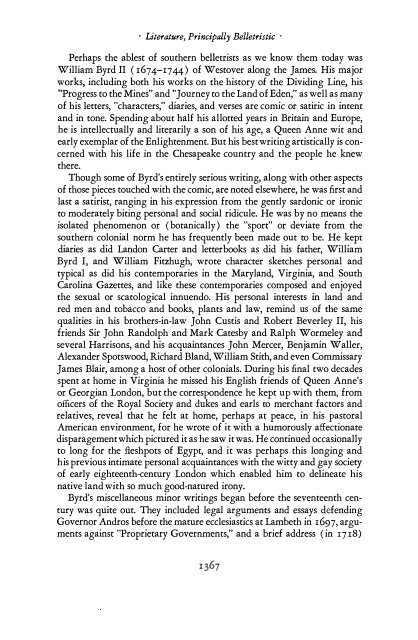Literature, Principally Belletristic - University of Tennessee, Knoxville
Literature, Principally Belletristic - University of Tennessee, Knoxville
Literature, Principally Belletristic - University of Tennessee, Knoxville
Create successful ePaper yourself
Turn your PDF publications into a flip-book with our unique Google optimized e-Paper software.
· <strong>Literature</strong>, <strong>Principally</strong> <strong>Belletristic</strong> .<br />
Perhaps the ablest <strong>of</strong> southern belletrists as we know them today was<br />
William Byrd II (1674-1744) <strong>of</strong> Westover along the James. His major<br />
works, including both his works on the history <strong>of</strong> the Dividing Line, his<br />
"Progress to the Mines" and ttJ ourney to the Land <strong>of</strong> Eden," as well as many<br />
<strong>of</strong> his letters, "characters," diaries, and verses are comic or satiric in intent<br />
and in tone. Spending about half his allotted years in Britain and Europe,<br />
he is intellectually and literarily a son <strong>of</strong> his age, a Queen Anne wit and<br />
early exemplar <strong>of</strong> the Enlightenment. But his best writing artistically is concerned<br />
with his life in the Chesapeake country and the people he knew<br />
there.<br />
Though some <strong>of</strong> Byrd's entirely serious writing, along with other aspects<br />
<strong>of</strong> those pieces touched with the comic, are noted elsewhere, he was first and<br />
last a satirist, ranging in his expression from the gently sardonic or ironic<br />
to moderately biting personal and social ridicule. He was by no means the<br />
isolated phenomenon or (botanically) the "sport" or deviate from the<br />
southern colonial norm he has frequently been made out to be. He kept<br />
diaries as did Landon Carter and letter books as did his father, William<br />
Byrd I, and William Fitzhugh, wrote character sketches personal and<br />
typical as did his contemporaries in the Maryland, Virginia, and South<br />
Carolina Gazettes, and like these contemporaries composed and enjoyed<br />
the sexual or scatological innuendo. His personal interests in land and<br />
red men and tobacco and books, plants and law, remind us <strong>of</strong> the same<br />
qualities in his brothers-in-law John Custis and Robert Beverley II, his<br />
friends Sir John Randolph and Mark Catesby and Ralph Wormeley and<br />
several Harrisons, and his acquaintances John Mercer, Benjamin Waller,<br />
Alexander Spotswood, Richard Bland, William Stith, and even Commissary<br />
J ames Blair, among a host <strong>of</strong> other colonials. During his final two decades<br />
spent at home in Virginia he missed his English friends <strong>of</strong> Queen Anne's<br />
or Georgian London, but the correspondence he kept up with them, from<br />
<strong>of</strong>ficers <strong>of</strong> the Royal Society and dukes and earls to merchant factors and<br />
relatives, reveal that he felt at home, perhaps at peace, in his pastoral<br />
American environment, for he wrote <strong>of</strong> it with a humorously affectionate<br />
disparagement which pictured it as he saw it was. He continued occasionally<br />
to long for the fleshpots <strong>of</strong> Egypt, and it was perhaps this longing and<br />
his previous intimate personal acquaintances with the witty and gay society<br />
<strong>of</strong> early eighteenth-century London which enabled him to delineate his<br />
native land with so much good-natured irony.<br />
Byrd's miscellaneous minor writings began before the seventeenth century<br />
was quite out. They included legal arguments and essays defending<br />
Governor Andros before the mature ecclesiastics at Lambeth in 1697, arguments<br />
against "Proprietary Governments," and a brief address (in 1718)















